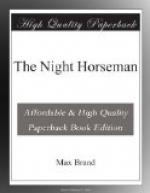“Well?”
“Doc,” said Buck with a shudder, “I ain’t goin’ to talk about the exceptions. Mostly the news we gets of Dan is about troubles he’s had. But sometimes we hear of gents he’s helped out when they was sick, and things like that. They ain’t nobody like Dan when a gent is down sick, I’ll tell a man!”
The doctor sighed.
He said: “And do I understand you to say that the girl and this man—Whistling Dan, as you call him—are intimately and sentimentally related?”
“She loves him,” said Daniels slowly. “She loves the ground he walks on and the places where he’s been.”
“But, sir, it would seem probable from your own reasoning that the return of the man, in this case, will not be unwelcome to her.”
“Reason?” broke out Daniels bitterly. “What the hell has reason got to do with Whistling Dan? Man, man! if Barry was to come back d’you suppose he’d remember that he’d once told Kate he loved her? Doc, I know him as near as any man can know him. I tell you, he thinks no more of her than—than the wild geese think of her. If old Joe dies because Dan is away—well, Cumberland is an old man anyway. But how could I stand to see Barry pass Kate by with an empty eye, the way he’d do if he come back? I’d want to kill him, and I’d get bumped off tryin’ it, like as not. And what would it do to Kate? It’d kill her, Doc, as sure as you’re born.”
“Your assumption being,” murmured the doctor, “that if she never sees the man again she will eventually forget him.”
“D’you forget a knife that’s sticking into you? No, she won’t forget him. But maybe after a while she’ll be able to stand thinkin’ about him. She’ll get used to the hurt. She’ll be able to talk and laugh the way she used to. Oh, doc, if you could of seen her as I’ve seen her in the old days——”
“When the man was with her?” cut in the doctor.
Buck Daniels caught his breath.
“Damn your eternal soul, doc!” he said softly.
And for a time neither of them spoke. Whatever went on in the mind of Daniels, it was something that contorted his face. As for Byrne, he was trying to match fact and possibility and he was finding a large gap between the two; for he tried to visualise the man whose presence had been food to old Joe Cumberland, and whose absence had taken the oil from the lamp so that the flame now flickered dimly, nearly out. But he could build no such picture. He could merely draw together a vague abstraction of a man to whom the storm and the wild geese who ride the storm had meaning and relationship. The logic which he loved was breaking to pieces in the hands of Randall Byrne.




